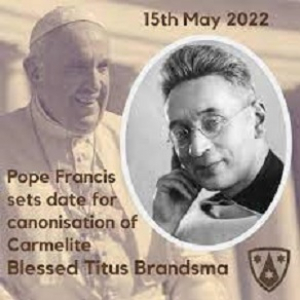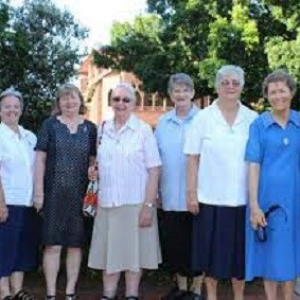Peter MALONE
Best wishes to our Carmelite confreres, May 15 canonisation, Titus Brandsma O.Carm
Best wishes to our Carmelite confreres, May 15 canonisation, Titus Brandsma O.Carm
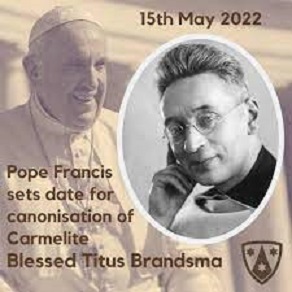
Titus Brandsma (23 February 1881 – 26 July 1942) was a Dutch Carmelite friar, Catholic priest and professor of philosophy. Brandsma was vehemently opposed to Nazi ideology and spoke out against it many times before the Second World War. He was imprisoned in the infamous Dachau concentration camp, where he was murdered.
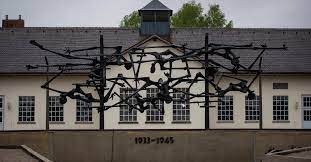
After the invasion of the Netherlands by the Third Reich in May 1940, Brandsma's long-term fight against the spread of Nazi ideology and for educational and press freedom brought him to the attention of the Nazis.
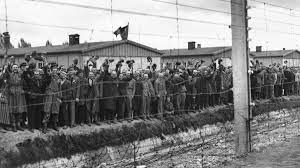
In January 1942 he undertook to deliver by hand a letter from the Conference of Dutch Bishops to the editors of Catholic newspapers in which the bishops ordered them not to print official Nazi documents, as was required under a new law by the German occupiers. He had visited fourteen editors before being arrested on 19 January at the Boxmeer monastery.
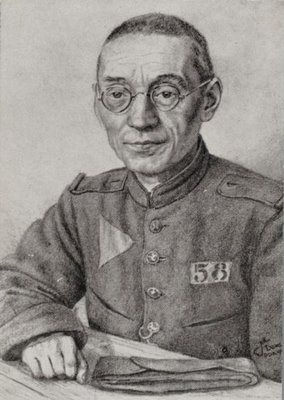
After being held prisoner in Scheveningen, Amersfoort, and Cleves, Brandsma was transferred to the Dachau concentration camp, arriving there on 19 June. His health quickly gave way, and he was transferred to the camp hospital. He died on 26 July 1942, from a lethal injection administered by a nurse] of the Allgemeine SS, as part of their program of medical experimentation on the prisoners.
Re-enactment for the Mary's Dowry Presents television series (2017) on lives of martyrs
Unusual MSC Statistics, episode three revisited and enlarged. MSC priests and brothers with sisters nuns.
Unusual MSC Statistics, episode three revisited and enlarged. MSC priests and brothers with sisters nuns.
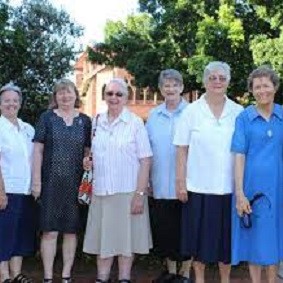
When we posted the list of MSC priests and brothers with sisters who were nuns, we had a list of 28 – which seemed rather large. We asked for any others, and thanks to Phil Reilly, Gerry Burke, Pat Austin and Jim Littleton for further information.
From 28, we have risen to 49! And some have had more than one sister, especially John Bell who had four Josephite sisters, James McNamara, John Burford, Wilfrid Dew (three sisters nuns), Pat Canty (Pat Austin’s uncle) who had two sisters. Colin Milne is a touch unique with his Sister of St Joseph of the Apparition.
Albert Chan, OLSH
Basil Clarke, OLSH
Bede North, OLSH
Bernie Smith, Mercy
Bob Lysaught, Little Company of Mary (2)
Bob Mitchell, Mercy
Brendan Sykes, OLSH
Chris McPhee, Marist
Colin Milne, St Joseph of the Apparition
Cuthbert Hoy, Presentation
Ed Bennett, Josephite
Edward Drohan, Brown Nurses
Frank Crilly, Josephite
Frank Flynn, Brigidine (2)
Harry, Con Jordan, Mercy
George Souter, Good Samaritan
Greg McCann Snr, Josephite
Jack Burford, three Josephites
James McNamara, 3 (or more) Josephites
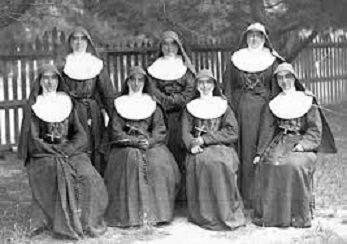 - along with OLSH, Josephites, RSJ, feature
- along with OLSH, Josephites, RSJ, feature
Jim Littleton, Ursuline
Joe O’Brien, Brigidine
John and Michael Forrest, OLSH
John Bell, Josephites (4)
John Dempsey, OLSH
John Franzmann, Presentation
John, Jim McMahon, Little Company of Mary
Leo Hill, Mercy
Malcolm Fyfe, OLSH
Noel Mansfield, John of God
Norbert Earl, Josephite
Patrick Canty, OLSH and Josephite
Patrick O’Carrigan, Sister of Charity
Paul Jennings, OLSH, Josephite
Peter Carroll, Josephite
Ray Campbell, congregation unknown
Russell, Frank Andersen, Little Company of Mary
Stan Tyler, Josephite
Stan, Michael Reis, OLSH
Ted McCormack, Presentation
Terry Barry, Josephite
Terry Naughton, Holy Spirit Sister
Toan Dinh Vinh Le, Vietnam, OLSH
Tom Collins, OLSH
Tom McMahon, Good Samaritan
Tom, Whitty, Presentation
Tony O’Brien, OLSH, Loretto
Vincent, Jim Dwyer, Little Company of Mary
Wilfred Dew, OLSH, Loreto, Good Shepherd

William, George, Philip Henschke, 2 OLSH
Outback GP emotional during health inquiry, Martin Kelly
Outback GP emotional during health inquiry, Martin Kelly

In the 1990s Martin Kelly, a doctor by training, joined the MSC. After some years of theology and formation he discerned that he should not continue but return to his medical work especially in out back Australia.
He spoke, with emotion, at a Senate Inquiry.
Dr Martin Kelly's voice has broken as he recalled at an inquiry the murder of his colleague Gayle Woodford, and he has pleaded for more protection funding.

Media report: A senior outback doctor has broken down during a federal health inquiry, saying it’s a “scandal” there is not enough funding to protect his staff six years after the abduction and murder of a colleague.
Nurse Gayle Woodford was murdered in the remote community of Fregon, in the APY lands in South Australia, after being tricked into opening a security gate around her home while on-call overnight in March 2016. Dudley Davey, who had a long history of violent crimes, pleaded guilty to her murder and rape and is serving a minimum 32-year jail term.
The SA government later passed Gayle’s Law, ensuring outback health workers are always accompanied by a support person on unscheduled or after-hours call-outs.
Dr Martin Kelly, the senior medical officer at Nganampa Health Council, which employed Ms Woodford, said the SA government has not funded the support worker program, while federal government funding is inadequate.

“It is a scandal, quite frankly,” Dr Kelly told the Senate inquiry into the provision of GP and primary health services in regional, rural and remote Australia in Whyalla on Tuesday.
Dr Kelly, who has worked in the indigenous Anangu Pitjantjatjara Yankunytjatjara (APY) lands for more than 20 years, spoke with deep emotion throughout his 30 minute evidence, his voice quivering while he recalled the death of his good friend and colleague.
“I was one of the last Nganampa people to talk to her, when she was on call, and I sat with her family for the four days over Easter until her body was found.”
Dr Kelly said the safety of Nganampa staff is critical. The health service has been absorbing the annual $300,000 shortfall to employ the support workers, putting its clinical operations at risk. “We’ve managed to keep all our clinics open in all that time with not enough money to do it,” he said.
Many Nganampa staff work long hours, seven days a week, a workload that has intensified during the pandemic. Telehealth and after-hours phone services can only do so much in a remote setting, Dr Kelly said.
“It’s not enough, you still need people on the ground to put a stethoscope on people’s chests. Sometimes you need to hold people’s hands as well. “The system is stretched beyond what is reasonable to expect and we’re being asked to do more and more with less and less.”
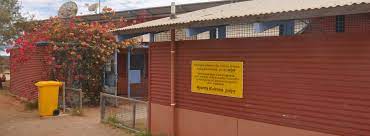
He said indigenous health should be a critical concern for all governments.
“I’ve been here for more than 20 years, and the median age of indigenous people on the APY lands is about 21. “So half the people who live on the land, I’ve known since they were born. They matter quite a lot to me.”
At a Silver Jubilee celebration, 2018, with Peter Harvey-Jackson and the group's Novice Master, Terry Naughton.
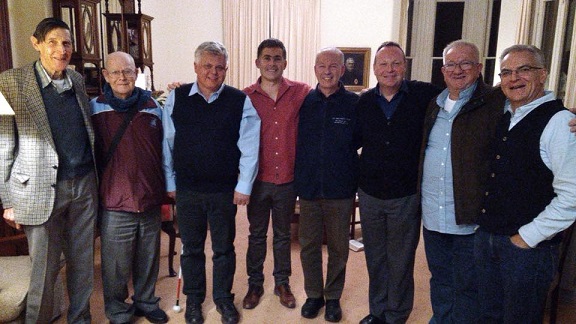
Gully
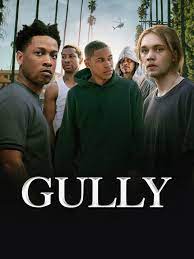
GULLY
US, 2019, 84 minutes, Colour.
Kelvin Harrison Jr, Jacob Latimore, Charlie Plummer, John Corbett, Amber Heard, Robin Givens, Terrence Howard.
Directed by Nabil Elderkin.
This is a comparatively brief slice of Los Angeles life, a rather grim look at the hard life, many glum moments.
The film has is very strong cast, led by Kelvin Harrison Jr, disillusioned with life, relying on his friends, playing tough computer games, often just sitting in the bath, waiting for the owner of the house, played by John Corbett, to come home – and his demands for sexual activity. The other African-American young man is played by Jacob Latimore, talented, resentful, drugs, computer games, urged by school authorities to do better but opting out. The third member of the group is played by Charlie Plummer, white, seen at home with his mother, played by Amber Heard, father long since gone, brutal towards his son. He is also resentful, teams with his friends as they travel around Los Angeles, observing, playing the computer games. He also visits a girlfriend and there is a discussion about an abortion, his not taking responsibility, her mother shouting him down. As he moved along
the streets, encounters a young man, artist, bashing him severely.
When the group finds out what is happening to their friend and his having to submit to sexual activity, they confront the man, violent, eventually shooting – and the white member of the group arrested, going to jail.
As a kind of odd chorus, there is a vagrant man on the streets, played by Terrence Howard, observing, making utterances about the men, about hardships of life.
Not the kind of film that is entertaining, even with strong performances, but to be seen as a social, sociological portrait of life on Los Angeles streets.
Innocents, The/ Norway 2021
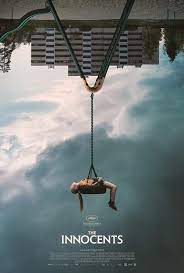
THE INNOCENTS
Norway, 2021, 117 minutes, Colour.
Rakel Lenora Flottum, Alva Brynsmo Ramstad, Sam Ashraf, Mina Yasmin Bremseth Asheim, Ellen Dorrit Peterson, Kudrow Yusuf.
Directed by Eskil Vogt.
The Innocents was also the title of the 1961 film version of Henry James novel, The Turn of the Screw. This was a story about children, initial innocence, a growing sense of malice and malevolence. The various film versions of The Turn of the Screw set something of a precedent for this unexpected story from Norway.
The film was directed and written by Eskil Vogt, who has made an impact over the years, with his drama film are, and his writing the screenplay for the Oscar-nominated The Worst Person in the World. He has written the screenplay from the point of view of children, but also from the point of view of adults/parents, observing behaviour, puzzled by behaviour, and sometimes victim of such behaviour.
The film opens with the family moving to a country town, a modern apartment complex with woods surrounding as well as a lake in the centre of the community. It is summer, definitely not Norwegian early darkness of autumn and winter. Interesting that a story about malevolence should take place mainly in bright sunlight.
There are two daughters in the family, Ida (Rakel Lenora Flottum) aged nine, the centre of the story. But she has an older sister, Anna (Alva Brynsmo Ramstad) who is explained as autistic, an extreme autism, her inability to focus on the reality around her, attracted and bemused erratically, uttering sounds, irritating Ida who almost immediately is seeg pinching her sister hard. So, intimations of hostility, violence and we are wondering where it will lead.
Where it leads, in fact, is Ida going out to play, encountering a young boy, Ben (Sam Ashraf). They click immediately, Ben showing Ida his capacity for a power to move objects by mind control. But, the seeming innocence is soon changed and the tone of the film sent on a particular direction when the two children high in the apartment block and drop a cat down a stairwell. The audience is somewhat relieved when the cat does not die – but, within moments, Ben in a moment of harshness stomps on the cat’s head. In fact, Ida is repulsed.
There is a further complication when Ida puts glass in her sister’s shoe but the audience sees another young girl, Aisha, putting on shoes with glass, her feet cut but her not feeling it. What the film then develops is a relationship between Aisha and the autistic sister, a kind of telepathy, Ben and Ida testing it out with games, and her becoming more communicative, the four children finding some peace in play.
However, it is not to last. This is a film about power, loss of innocence, darkness in children, malice in behaviour, malevolence in attitude. And, Ben embodies it to the full, exercising dark powers which lead to malicious deaths.
Which places a challenge to Ida, to save Anna, to ward off Ben, even to eliminate him, destroy him.
As expected, in the sunlight, the film comes to a conclusion, Ida making decisions, consequences for Anna, and a fate for Ben on a playground swing in that bright sunlight.
And great deal to reflect on in terms of good and evil, intentions of good, intentions of evil, malice, and all in the context of young children.
- The title and expectations? Children? The initial presentation of the children? The moving to different powers? Sinister behaviour? Moving to malevolence?
- The Norway settings, the town, the summer, people absent, people returning, the woods, the lake? The interiors of homes? The musical score?
- The basic presupposition of the narrative, children with powers, using them cruelly, malevolently, against each other? Absolute malevolence? Participating and then change? Victims?
- The initial car ride, moving to the apartment, the family, the focus on Ida, asleep, innocent, then pinching her sister, her place in the household, age 9, wilful? The relationships with her parents? Going out, the encounter with Ben, the instant friendship, out in the woods, able to move stones and objects, her wanting to try? The pet cat? The staircase, dropping the cat, its injuries, surviving, then finding it, stomping on its head, Ida’s reaction? Later seeing the dead cat? Ida and the relationship with Anna, looking after her, taking her out? The encounters with Aisha? The puzzle about Aisha and the connection with Anna, and her improvement?
- Anna, the autism, her age, not connecting with people, the sounds, fascination, scribbling on the slate? With her mother? Anna’s treatment? Visit to the therapist? Going out, and Ida putting the glass in her shoes? The switch to Aisha, her mother, her shoes, the blood, her not feeling the wound? The bond between the two girls? The communication, words?
- Ben, his awareness, the testing out of the communication between the two girls, whispering, distances? The bonding?
- Ben, the growing malevolence, his power of controlling things, people, the man going onto the bridge, the footballing boy, the murder? Ida becoming more aware of this? Ben at home, the relationship with his mother, her death? His being wrapped in his malevolence?
- Anna, the realisation, Ida beginning to protect her? Going out with Ben, the model plane, flying it, the bridge, her pushing him over? The woman seeing her, Ida and the reality, her vision of people in the woods, the dark? The car hitting her, hospital, injuries? Ben recovering and getting away?
- Aisha, the communication with Anna? Her fears at home, her reliance on her mother? Her mother possessed by Ben, stabbing her daughter? Her death, the monument, Ida and her mother present?
- Anna, the consequences, going out, confronting Ben, the movement of the sand, the water, Ben sitting on the swing, exercising his power, Anna with the stronger power, his sitting dead in the swing?
- Ida, her concern, breaking the cast, going to rescue Anna?
- The role of the parents throughout, the father and his work, yet care, the delight in Anna’s improvement, their hopes?
- The end, and are reverting, Ida with her?
- The eerie experience for an adult audience, innocence and malevolence of children, and dire consequences?
Julia/ 2022
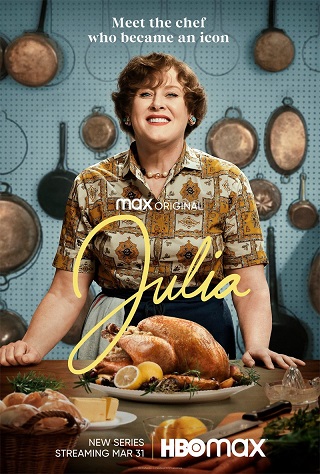
JULIA
US, 2021, 8X 45, Colour.
Sarah Lancashire, David Hyde Pierce, Bebe Neuwirth, Fran Kranz, Fiona Glasscott, Brittany Bradford, Robert Joy, Michael Malvesti, Adriane Lennox, Judith Light, Jefferson Mays, Lindsay Broad, Isabella Rossellini, Tosin Morohunfola.
Directed by Jenne LaMarque, Melanie Mayron, Charles McDougall, Erica Dunton, Scott Ellis, Charles McDougall.
Julia Child is immortal in the history of American cooking. She was the subject of an interesting documentary, Julia, 2021, going back over her history, but with a lot of talking heads and interviews, the retrospect about her life and career and influence. There was a 2009 Nora Ephron film, Julie and Julia, with Meryl Streep as Julia Child and Amy Adams as Julie Powell, an admirer of Julia Child who set out to reproduce all of Julia Child’s recipes. So, she is part of cinema consciousness as well.
This miniseries presupposes audience knowledge of Julia Child, her background (and her crusty father, played by James Cromwell, appearing in a visit to his daughter, antipathetic to her husband and his painting career). It also presupposes some knowledge of Paul Child and his diplomatic work, his postings, World War II, he and his wife’s presence in France. And it presupposes audience awareness that this is where Julia developed her knowledge and practice of French cooking.
The focus of this miniseries is one year, the early 1960s, echoes of the Kennedy era, quotes from Kennedy, early years of television, the development of Public Television, especially in Boston. While Julia and Paul Child had settled in Boston, Julia was somewhat restless, having published a book on Mastering French Cooking, cowritten by her French friend, Siska (played by Isabella Rossellini), she found herself being interviewed by a supercilious professor on a book program, she deciding to cook an omelette on set. She was intrigued by this, letters coming into the station in favour of her, her deciding then to propose a program to the station, not explaining this to her husband, relying on her close friend, Avis (Bebe Newiwrth), financing the pilot herself.
There is a lot of time spent on the set, establishing it, building it, Paul interfering with the design, Julia and her demands, the reaction of the producers, especially Russ (Fran Kranz) hostile, thinking cooking below the dignity of public television. However, there is a support from African-American producer, Alice (Brittany Bradford). Each episode of the television series has a title from a particular menu to be cooked.
Audiences who enjoy cooking programs will be delighted by the procedures, learning how a half hour program is planned, rehearsed, performed. There is quite some human drama, supercilious attitudes on the male producers, the support of the station head, played by Robert Joy, Julia’s connection with Judith, her editor with Alfred Knopf publishing, the background story of Judith Jones, her skills in editing, especially with John Updike (and a sequence where he is persuaded to be interviewed on public television), and a portrait of the very demanding Blanche Knopf played effectively by Judith Light. With Paul Child and Blanche Knopf, and Siska in France, there is a lot of spurning of television and reliance on books.
There are some plot stories with Alice, her critical mother, her meeting a young man. Stories of Russ, his wife’s pregnancy, their both learning to cook. And the role of Judith and her work as her book editor.
Sarah Lancashire is excellent as Judith Child, voice, presence, intonations, the final bon appetit. David Hyde Pierce has an excellent role as her husband. There are many episodes in Boston, a visit to San Francisco an indication, as in real life, that Julia Child supported more liberal stances, her visit to a gay club and singing with the Drag Queen. But there is also a visit to a celebration in New York, a gala in her honour, but the chance meeting with feminist Betty Friedan who criticises her program as being anti-feminist. Which puts a doubt into Julia’s mind as to whether she should continue with her program, eventually being persuaded, after confessing her deceptions to Paul about getting the program going, to sign a contract for a new season.
- The history of Julia Child, her role in French cooking, bring it to the United States, her books, the television program, subsequent influences? Audience knowledge of Julia Child, seeing her programs, television interviews, the documentary of 2021, Julia, Meryl Streep impersonating her in Julie and Julia?
- Sarah Lancashire in the role, British background, Julia’s accent, voice pitch, intonations, screen presence, larger-than-life presence?
- The effect of the television series, the eight different chapters with different cooking invitations? Illustrated throughout? Cumulative effect of this story, the personal story of Julia and Paul, the television program, public television in Boston in the 1960s, the influence on people? The critique by Betty Friedan and feminists?
- A portrait of Julia Child, references to the past, the visit from her father, wealth, a cranky old man, critical of Paul, critical of his daughter, yet some support? Her marriage to Paul, his being a diplomat, the postings? The time in France, her learning French cooking? The talent as a cook? The collaboration with Siska, the writing of the book, publication, popularity, in the United States? The title of “”mastering””? The opening scene in Norway, the friends, the posting to France – and the transition then to Boston in the early 1960s, the Kennedy era and the references?
- Julie and Paul, their relationship, Paul as a diplomat, finishing his career, covering about being fired? Retirement, his painting, photography, seeing him at work, painting the pears, the later exhibition and some of the sales? Old-fashioned, antipathy towards television as temporary and frivolous, his support of Julia, love for her, yet her going around him to propose the television program, Avis and her helping to persuade Paul, arranging the art exhibition? Talking him around, his support, going to the studio, supervising the building of the set, interfering? Change of heart? Julia buying the television set, watching? His becoming more involved? Julia’s father and his visit, antipathy towards Paul?
- Julia, the interview, her book, the supercilious interviewer, her taking over, getting the hotplate, making the omelette, his reaction, eating it? The later encounters with him, his demands, the network staff, his wanting better interviewees, Alice, interactions with her, his demands, Julia and her friendship with Judith, getting John Updike on the show, Julia meeting him privately, then formally, and the tone of the interview with the interviewer, the questions about jogging, the improvement? The interviewer and his farewelling of Julia – and his dismay at her return?
- The issue of the show, her idea, proposing it, Russ and the other executives, not their image of public television, their reaction to her, her offering to pay, the support of Alice? The details of putting on the show, setting up the set, Julia ignorant of television sets, but working, the camera, the workers, her cheery response? The 27 letters from fans, the male executive and the reaction? Hunter, leading the network, his wife? His endorsing the show? Alice and her support?
- The development of the show over the years, the building of the sets, Julia’s demands, the range of cooking demonstrations, Avis and Dorothy helping her, unseen, learning camera techniques for whisking, Julia and her cooking lessons at home, raising funds for the program? Over the months, the improvement, Hunter and his enthusiasm? Russ and his frustrations? His wife, her cooking, pregnancy? His ambitions to do documentaries? Trapped with The French Cook, Alice and her continued support, bringing Julia to the station, explaining situations? Alice answering the phone, the sales to San Francisco? Russ and his reaction, Hunter and his reaction, carrying on, but pleased with the results?
- Judith and Paul attempts at bread?
- The visit to San Francisco, the acclaim for Julia, the negotiations with the local station, Julia and her speech, her demonstration, positive response? Her meeting with Beard, the discussions about cooking? The gay man, the dinner, his flirtatious manner, taking her to the gay club, the Drag Queen and his name, her singing with him? Coming home, not able to contact Paul, the big queues for her book signing, his petulance? Going out with an old friend?
- The changing prospects, Russ and his greater involvement, Hunter and his enthusiasm, change of offers to Russ?
- Alice, the scenes with her mother, black career woman, her mother’s taunts, Alice cooking, going to New York, the gala, the encounter with Isaac, the meal, talk, bonding, his legal background? Phone calls, outing, her mother happy, prospects? Alice and her being promoted by Hunter?
- The gala, Julia enjoying it, the encounter with Betty Friedan, the seeming friendship, Betty Friedan’s feminist critique? The effect on Julia, long-lasting?
- The decision that that be the end of the show, talking with Avis? Avis and her continued support, sardonic, the day chaperoning Paul with his flu?
- Julia, things going wrong with the last session? Then her change of heart, the discussions with Paul, the confession of her deceit, his reactions, eventually coming round?
- Hunter, apprehensions, Julia with the new contract, Alice and her promotion?
- The influence of Julia child on American cooking habits?
The Drover's Wife The Legend of Molly Johnson
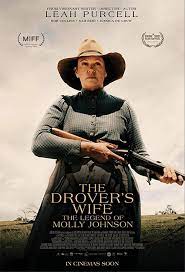
THE DROVER'S WIFE THE LEGEND MOLLY JOHNSON
Australia, 2021, 109 minutes, Colour.
Leah Purcell, Rob Collins, Sam Reid, Jessica De Gouw, Anthony Cogin, Harry Greenwood, Benedict Hardie, Nicholas Hope, Bruce Spence, Maggie Dence.
Directed by Leah Purcell.
Henry Lawson’s 1892 short story is an Australian classic. Writer/director/actor Leah Purcell has spoken of her love for the story from her childhood, opening up her imagination. In later years, she has certainly opened up her imagination in exploring the characters of Lawson’s story, shaping the story into a theatre drama, award-winning, then a novel, award-winning. Now she has made the film version, an obvious nominee for film awards.
Leah Purcell has made this a darker and bleaker story than Henry Lawson’s. She gives a name to the drover’s wife, Molly Johnson, her husband droving sheep in the mountains, frequently absent, her living with her children, pregnant at the opening of the film. She lives a hard life, surviving, the harsh birth sequence, grief.
The audience is taken into Molly Johnson’s life, the basic hut, and her often busily sweeping neatness on the dusty entry, austere but surrounded by extraordinary photography of the Snowy Mountains, the landscapes around Adaminaby – although this is the opposite mood from The Man from Snowy River.
Meanwhile a local town is growing, a young British policeman and his wife pass by the hut (Sam Reid, Jessica De Gouw), a sympathy for Molly, the wife, eager to write articles on the situation of women in the bush, also eager to help. But, her husband, is very strictly law and order. And there is a lot to be concerned about, the rough life in the town, the visiting drovers and Wanderers, the women and the brothels, the difficulties of imposing order. And, there are strict people in the town, Bruce Spence as the local priest, Maggie Dence his austere sister -– and some of their taints of racial prejudice and superiority, all delivered with righteous certainty.
However, at the centre of this tale is an aboriginal man, Yadaka, played by the versatile Rob Collins. He is wanted for murder, turns up at the drover’s hut, threatened by Molly, eventually some understanding, his helping Molly’s oldest son, moments of initiation rituals. He is able to tell his story, a strange story of his being taken from his family, working in a circus, searching for a peaceful place in the bush. This place is a dream of hope in your bleak storytelling. He also has stories about Molly’s mother and father which heighten the racial tensions.
And then the tale becomes grimmer. The drover’s friends turning up, threatening Yadaka, Molly fearing danger for her children, but her then becoming target of the law abiding policeman.
Lawson highlighted the loneliness of the drover’s wife, the isolation. This is certainly to the fore in Leah Purcell’s interpretation, strengthened by Leah Purcell’s powerful screen presence. But she is a force to be reckoned with even as she is victimised – and this interpretation is a fierce indictment of macho arrogance of the 19th century male (and all who are descended from these 19th-century migrants will be alarmed at these aspects of their heritage). You are able to stir deeply as well as stir up all kinds of emotions in us, a greater awareness of Molly’s life and pain – and Leah Purcell does not spare us the vicious and raping attack on her, her violent response.
Which means that many audiences will see this as a late 19th century, early 20th century Me#Too stand for women and their rights, condemnation of male violence and brutality. This is made especially strong in the final sequences, perhaps dramatically unnecessary – or too explicit, but nevertheless, thematically relevant, then and now.
Leah Purcell has made a drama, bringing her first nation experiences and sensibilities to her writing and to her performance, one of those Australian films that, however tough it might be, should be seen.
- The impact of the film? Reputation? The work of the Leah Purcell, writing, directing, performing?
- Henry Lawson story, 1892, the bush, the isolation of the drover’s wife, with her children? The drover away? Leah Purcell’s adaptation, giving the wife and name, names of the children, visualising the hut, the drover droving sheep, the high country, the isolation, the wife and her pregnancy, the difficulty of her birth, the death of the child, burial? A hard life?
- The mountain photography, the sweep of the beauty, the mountain with the hut, the mountains and the sheep and the droving? The contrast with the town, being built, harsh, streets, buildings, homes? The fair and the celebration and the various stalls and attractions? The musical score?
- Henry Lawson and the loneliness and isolation of the wife? Leah Purcell, the issue of isolation, but also relationships between men and women, the brutality of men, the pressure on women, violent reaction? The wife wanting to write the articles and stories? The arrest of Molly, the interrogation, the harshness of the law, the execution scene, the protests, the women with their aprons, some dramatic overstatement, but the continued relevance of the theme in the contemporary world?
- First nation issues, the status of aboriginal peoples at the end of the 19th century, racism, supremacist attitudes, segregation, abusive behaviour, violence – even to slavery? The aboriginal communities, traditions, but the disruption of families, the young men going to the circus, surviving, accused of murder? The mixed marriages? Yadaka and his stories, the revelation of Molly, her parents, ancestry? And the effect on her children? The priest and his sister, inherent racism and supremacy, wanting to deprive Molly of her children?
- Molly, first seeing her, strong stand, sweeping the path, with the children, pregnant? The policeman and his wife, passing by, coming up, talking, the wife and her concern, wanting to help the children, taking them to town? The policeman, his attitude towards the law?
- Yadaka, strong aboriginal man, his presence, Molly’s reaction, hostile, the gun? Gradual helping, talking, assisting with the birth, the burial of the child and Molly mourning it? With the oldest boy, the rituals, beginnings of initiation? His story about his own life, about Molly’s family? On the run?
- The policeman, his work in the town, story of the white family massacred, the notice with the image of Yadaka? His strict attitudes? His love for her wife, her illness, trying to cope, recovering? His assistant, spectacles, not active? The judge, severe attitudes, the cases? Life in the town, the women, the prostitutes, the men, drinking, brutality? The revelation that the drover lived like this, with the women, his treatment of Molly, the gradual revelation that she killed him, buried him? And the policeman’s suspicions?
- The priest, his sister, the manner of civilisation in this town, religion, talk, the sister and her superior attitude towards Molly, the children as octoroons? The consequences?
- The policeman’s wife, recovering from illness, writing the stories, concerned about Molly?
- The drunken men, friends with the drover, coming to the house, confronting Molly, confronting Yadaka, the audience shock at their hanging him? The treatment of Molly, the rape and abuse? Her response, the gun, the shootings? Audience sympathy with her, discussed with the male brutality?
- The policeman, arresting Molly, in jail, the wife and her help, her stories? Molly, stoic, accepting her fate? Concerned about her children, the scenes of the relationship with her, the oldest boy? Her rescuing them, sending them to the rock which Yadegar had described and the film visualised?
- The hanging, the women, the protests, the aprons, a 21st-century dramatic perspective on these issues?
- The aftermath, the children, finding the refuge, scenes of the future, their growing up, telling the stories?
- An important visualisation of the Australian heritage, the colonial attitudes, the drovers of workers, the women, the search respectability, attitude towards First Nation’s people, oppression and prejudice, violence? The film as an indictment of the harsh and brutal attitudes of men in the 19th century – and beyond?
Love You Like That
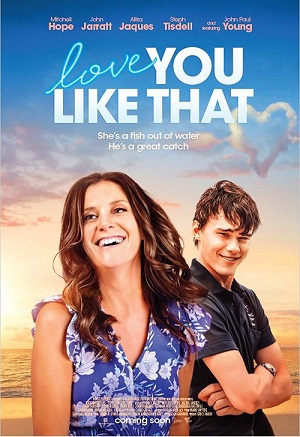
LOVE YOU LIKE THAT
Australia, 2021, 104 minutes, Colour.
Mitchell Hope, Allira Jaques, John Jarratt, Chris Haywood, Steph Tisdelll, John Harding, Anthony King.
Directed by Eric C. Nash.
An Australian beach town, pleasant scenery, a whole range of characters you might expect to see in a film like this or a television series, memories of Home and Away… There are some young people, especially Mitchell Hope who runs an online dating agency and has to look handsome because of what the plot has in store for him. There are all the middle-aged characters, men and women, memories of relationships, broken relationships, disappearances… And there are two old codgers played by John Jarratt and Chris Haywood.
But, it is the plot development which seems to divide viewers into fans and those who really dislike the film. The fans see it as a charming romantic comedy, with plenty of resolutions for romance. Those who don’t like the film see it as too improbable to believe, and with too much of the touch of twee.
And this is brought about when John Jarratt finds a woman on the beach, revives her, brings her to the hospital, tries to find out who she is. She meets all the characters, is very nice with them all. The revelation eventually comes through Chris Haywood, who plays Mitchell Hope’s father as well. And, for many, and this reviewer included, beyond belief. She turns out to be the Greek goddess Aphrodite (well out of her geographical origins in the Aegean Mediterranean). Apparently, she turns up in the town every couple of years – and had a relationship with Chris Haywood which means then that her son is actually Cupid!! (No wonder he runs a dating service.) So, the young man has been concerned about an absent mother, clashing with his father, has a nice girlfriend, and reuniting then with his mother. Allira Jaques is quite charming in her way as Aphrodite whom everybody calls Mim because she turned up on Mim Beach.
Very much take it or leave it so, in fairness, an enthusiastic blogger on the IMDb and a blogger who is far less enthusiastic.
gedgundrum9 November 2021
Just what we all need at this time ? An uplifting couple of hours with plenty of laughs, emotions, beautiful Australian scenery. Loved it ❤ I honestly don't understand how anyone could say anything bad about it.
bookoolafarm12 February 2022
I am a HUGE fan of Australian movies but this is awful! Only interesting character is Emily which is decently acted by Steph Tisdell. The storyline is boring and disjointed. I can't believe I paid to watch this.
Seeing the positive reviews I am wondering if they were all done by family and friends of the cast.
Endangered Species/ 2021
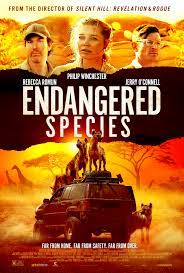
ENDANGERED SPECIES
UK, 2021, 104 minutes, Colour.
Rebecca Romijn, Philip Winchester, Isabel Bassett, Michael Johnston, Chris Fisher, Jerry O'Connell, George Glenn Ouma.
Directed by M.J.Bassett.
Endangered Species takes its audience on a trip to Africa, to Kenya, to the wildlife national parks, to the luxury resorts, to the safaris, to encounters with poachers. It is very well intentioned, giving statistics about the poaching of rhinoceros, elephants, trade in tasks, the brutality of the hunting.
However, the film can be quite irritating at times – but this is because of the American family which goes on holiday, safari to Africa. They are wealthy Americans (although the father is in danger of losing his job in the oil industry), the mother something of a crusader, her daughter, irritated with her stepfather, rebellious (played by Isabel Bassett who co-wrote the screenplay with her parent, M.J.Bassett), along with her rather scruffy boyfriend who turns out to be better than we might have expected. There is also a petulant son, demands made on him by his father, his coming out as gay.
We are also introduced to poachers, led by Jerry O’Connell (married in real life to Rebecca Romijn). The poachers turn out to be exceedingly dastardly in the final part of the film, the family in considerable danger.
There are plenty of scenes of wildlife, but also scenes of danger, especially with rhinoceros wanting to defend its young. There are also plenty of hyenas and a leopard attacking the boyfriend.
A lot of this happens because, once again very American presumptuous, the father decides he can’t waste time signing in and going into the national Park which means then that when the car is attacked by the rhinoceros, breaks down, they are reduced to walking, running risks of the animals, crossing rivers… And the extreme threat and physical danger from the poachers at the end.
Worthy intentions, irritating American family.
6 Below/ 6 Below: Miracle on the Mountain
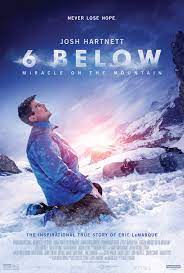
6 BELOW/6 BELOW: MIRACLE ON THE MOUNTAIN
US, 2017, 98 minutes, Colour.
Josh Hartnett, Mira Sorvino, Sarah Dumont, Kale Culley, Jason Cottle.
Directed by Scott Waugh.
This film is based on a true story, the story of Eric LeMarque, his family background, oppressive father, concerned mother, seemed to him as a boy, as a young man, the father setting high expectations and abusive of his son.
Le Marque was a hockey player, and there are flashbacks scenes to hockey games.
However, the focus of the film is his drug addiction, preparation for a court appearance, his going into the mountains on the days before, the exhilaration of being in the mountains, that he is being lost, surviving, limited food, water, the need for shelter, physical condition, health.
He is played by Josh Hartnett with Mira Sorvino as his mother. Sarah Dumont appears as a local worker who gives him a lift to the snowfields but then is involved in the organisation of the helicopter rescue.
The actual Eric Le Marque appears at the end of the film – two legs amputated, but his appearing with young people, exhorting them, morale boosting.
- A story of endurance? A story of hardship, change of heart?
- The mountain location photography, beauty, harsh, night and day? Whether? The ski resort? Flashbacks to home? Flashbacks to hockey games? The musical score?
- True story, the book by Eric Le Marque, his appearance at the end of the film?
- The focus on the days before his court appearance, the pressure on him, drugs, the anguish of his mother, her insistence on the court appearance? His going on to the mountain, his skills, enjoyment? The change of weather, going out, getting lost, the many days, sheltering, limited food, snow and water, shelter, physical injury, physical health?
- Flashbacks, his relationship with his mother, the harshness of his father, his father putting him down, expectations? The hockey games, his skills, clashes with the referee? Friends, drugs?
- The encounter with Sarah, her giving him a lift, her role with the rescue, his mother coming and putting pressure, Sarah remembering giving him the lift, the organisation of the helicopters, the searches, the style for rescue?
- The aftermath, the rescue, Eric losing his legs, his talking with the children, motivations and morale?
- The effect of the blend of mountain adventure, being lost and rescued, change of heart and morale boosting?
